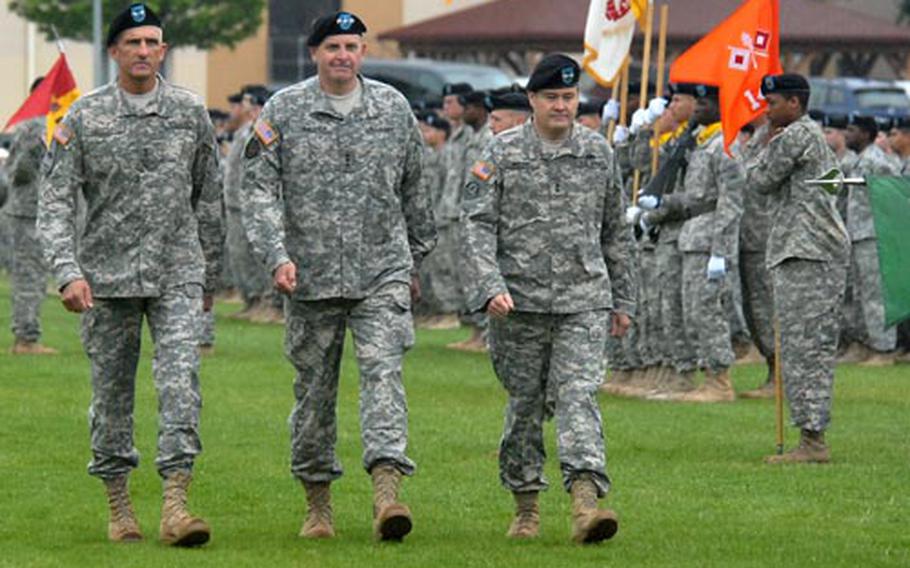
Outgoing 1st Armored Division commander Maj. Gen. Mark Hertling, V Corps commander Lt. Gen. Kenneth Hunzeker and incoming 1st AD commander Maj. Gen. Terry Wolff, from left, inspect the troops at the beginning of the division's change of command ceremony in Wiesbaden, Germany, on Tuesday. (Michael Abrams / Stars and Stripes)
WIESBADEN, Germany — Gusty winds and a steady downpour of rain at Wiesbaden Army Airfield provided the backdrop Tuesday for soldiers, family members and local leaders to witness Maj. Gen. Terry A. Wolff become the 46th commander of the 1st Armored Division.
On the parade field, soldiers watched Maj. Gen. Mark P. Hertling relinquish his command of the "Old Ironsides" division.
"They say soldiering is an outdoor sport and it surely is today," said Lt. Gen. Kenneth W. Hunzeker, V Corps commander.
Change-of-command ceremonies have been part of the Army tradition since the American Revolution, and they have been a part of 1st AD tradition since July 1940, when Maj. Gen. Bruce R. Magruder became the first commander of the division.
Winds of change rippled through every layer of Tuesday’s ceremony — from a new commanding general to the parade field itself, which is now devoid of its hallmark tanks. The tanks were moved earlier this year to clear room in anticipation of 7th Army’s move from Heidelberg to Wiesbaden.
Wolff is aware of the changes affecting the division and the community. He hopes to build on the relationship with the local population that Hertling worked hard to solidify.
"I think the real issue is that we continue to form and build on the bonds that we’ve tied to this community, not only for the 1st Armored Division headquarters but also for the move of 7th Army," Wolff said.
Wolff’s ties to 1st AD go back almost 26 years. He served two previous tours with the division, the most recent being nearly nine years ago, when he served as the division’s operations officer helping plan the deployment of soldiers to Kosovo.
The 1st AD headquarters has subordinate elements scattered throughout the world from Germany, the United States and the Middle East. Wolff is realistic about the challenges this provides him, but he sees advantages as well.
"Division leadership and the staffs are required to operate over huge geographical dispersed areas, just like what you’re seeing in Iraq and Afghanistan now, so it kind of replicates those same sort of conditions that we’re seeing in combat," said Wolff, whose previous assignment was on the National Security Council, where he served as a special assistant to the president and senior director for Iraq and Afghanistan.
With speculation abundant about the future of the division and an upcoming deployment of the headquarters staff, Wolff said that the Department of the Army has not issued any official deployment orders as of now, but he will prepare the division for any contingency.
Hertling’s next assignment will take him to Fort Monroe, Va., where he will serve as a special assistant to Gen. Martin E. Dempsey, who now heads the Army’s Training and Doctrine Command.